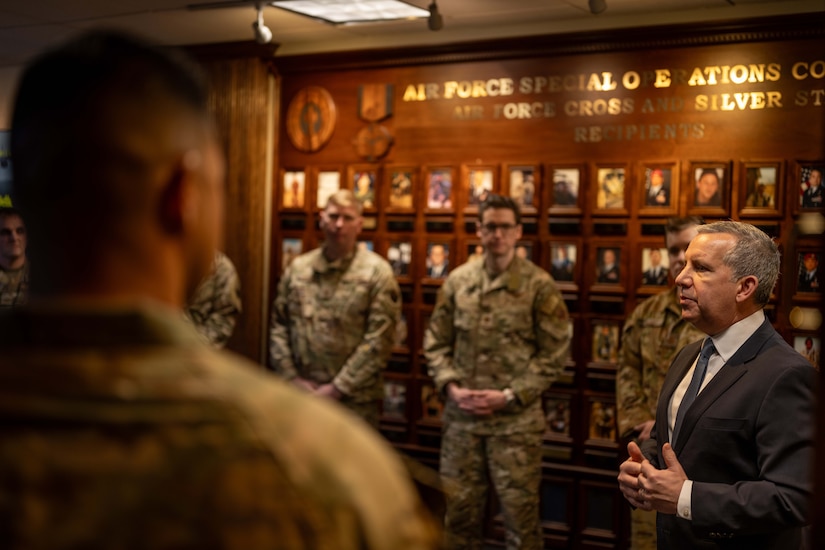A senior Pentagon official is shining a bright light on top performing leaders as part of the Defense Department’s mission to drive safety and risk management throughout the total force and take care of those who serve.
Peter I. Belk, performing the duties of assistant secretary of defense for readiness, said continuing to inculcate a culture of safety across the Defense Department is not only critical for mission success but also has widespread impact on service members, civilian personnel, and their families.
“One of the most striking things about the safety portfolio is its impact on our service members and civilian personnel — both when we do everything that we are committed to doing to take care of our people and also sometimes when those things aren’t happening the way we intended — and, candidly, how profound those impacts are on our families, our communities,” he said.
Since undertaking his role as the principal adviser to the secretary of defense and the undersecretary of defense for personnel and readiness on readiness across the services, Belk has prioritized efforts to continue inculcating an enduring culture of safety throughout the department.
One way to do so, he decided, is to get out to the units and recognize those leaders who foster that commitment to safety day in and day out.
Belk and his team have set out to meet face to face with top performing units as part of a series of engagements to emphasize the importance of safety and recognize leaders for their commitment to ensuring safety remains a core value.
In January Belk traveled to Fort Liberty, North Carolina, to recognize the XVIII Airborne Corps and its commanding general, Army Lt. Gen. Christopher T. Donahue, for their significant contributions to risk mitigation and personnel well-being while executing their mission to defend the nation.
While there, he also held round table discussions with leaders from other Fort Liberty component units to learn more about safety successes and challenges.
In February, Belk traveled to Marine Corps Air Facility, Quantico, Virginia, to thank and recognize the installation’s leaders for their consistent commitment to reducing risk and their proactive engagement to keeping Marines and the civilian workforce safe.
He also visited the Transportation Demonstration Support Area — a 395-acre plot on Quantico where Marines test new vehicles — to recognize its leaders and team members for their commitment to safety.
Later that same month, Belk met with Air Force Lt. Gen. Tony D. Bauernfeind and members of the Air Force Special Operations Command safety team at Hurlburt Field, Florida, where he recognized individual AFSOC members for their accomplishments in promoting safety and to discuss their initiatives on tactical safety and human factors psychology.
In March, he recognized members of the Air Force’s Radio Isotope Committee during a visit to the Defense Health Headquarters in Falls Church, Virginia, to acknowledge their recent completion of a Nuclear Regulatory Commission biennial inspection that yielded no violations.
These engagements have given Belk and his team a firsthand look at how frontline leaders manage risk and promote safety while completing a wide variety of missions.
Belk said while the units’ missions vary, successful leaders embody several common tenets in managing risk. Those include sound judgement, humility, self-awareness, and a steadfast commitment to people.
“The people with whom I have met all share a lot of passion and empathy for their colleagues, their service members—their teammates,” he said. “It’s awe-inspiring.”
He added that when it comes to promoting safety, everyone is a leader.
“Every single one of us, from the private up to the most senior general, flag officer, civilian, has an opportunity to lead when it comes to safety and risk management,” Belk said. “The more we recognize those who are connecting, motivating and inspiring others to work safely, the more we demonstrate it’s something everyone can do. Everyone has a role and an opportunity to proactively reduce risk and protect each other.”
Promoting a culture of safety throughout the department is a key component of Secretary of Defense Lloyd J. Austin’s “Taking Care of Our Service Members and Families” initiative.
In addition to emphasizing safety, Austin’s focus on the force includes efforts to promote health and wellness as well as financial security and support for military families through child care and spousal support initiatives.
Belk said taking care of the department’s service members and civilian personnel is synonymous with safety.
“That is entirely consistent with and at the heart of what we’re thinking about when we’re aligning to Secretary Austin’s priorities,” he said.








